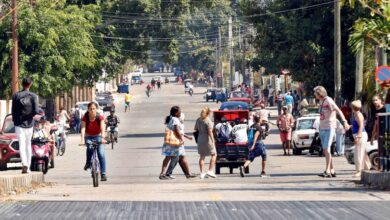Russia and its strategy with Venezuela
Listen this article
From the support to Maduro to the arrival of several military aircraft, Russia has Venezuela in its sights

When Juan Guaidó proclaimed himself interim president of Venezuela on January 23, 2019, more than 50 countries and several organizations decided to recognize his mandate, as a way to disapprove the management of Nicolás Maduro as president. The above, due to the strong social and economic crisis that the country is going through.
Leer en español: Rusia y su estrategia con Venezuela
However, countries such as Cuba, Turkey, Iran, China, Russia, among others, made clear their disapproval of the Guaidó measure, expressing support for Nicolás Maduro's mandate. The ideological affinities of these countries allowed Maduro's mandate to still have oxygen to breathe in the midst of international pressure and one of the worst humanitarian crises on the continent.
This is why Russia, one of the countries with the most economic and military capacity, decided to take a closer look at the country, which is surrounded not only by opposition governments but also by the persistent presence of the United States. A country headed by Donald Trump, who has repeatedly launched strong criticism of Maduro and his way of handling the situation.
Maybe he'll read: Neither Maduro nor Guaidó! The diplomatic clash between the USA and Russia
Russia and Venezuela's control
It is clear that Russia will not leave guideless one of the few countries that still maintains socialism as its economic and social model. Political, social and economic instability is the ideal scenario to influence the decisions of the country. But at what cost?
The arrival of Russian military warplanes put the international community on alert, who fear a possible military intervention as a way to resolve the crisis. While at the time there was no clear response to the reasons for his arrival in the country, his presence plus the "two IL-62 and AN-124 military transport aircraft with 100 commanded soldiers", according to Política Internacional evidences the desire to keep Nicolás Maduro as president.
To this must be added the letter sent by the Russian ambassador in Bogotá, Sergei Koshkin, to Alejandro Chacón, president of the House of Representatives of the Colombian Congress, in which he stated "that any type of incursion into Venezuela, which be supported by the countries that have supported the opposition to the Nicolás Maduro regime – as is the case of Colombia – will be interpreted by Moscow as a threat to peace and international security", according to El Tiempo.
In addition, the close relationship between Russia and Venezuela has allowed the entry of medicines and food, this being practically the only international aid accepted by Maduro for the Venezuelan population; product of a relationship of years ago where Hugo Chávez was responsible for strengthening not only by visiting the European country about 11 times but requesting credits for the purchase of Russian military weapons.
On the other hand, the Russian military arrival is a warning to the United States, a country that, in the case of a military intervention, is the only one that has the capacity to contain it. On several occasions Donald Trump has mentioned the need for military intervention as an effective and quick method to end the Venezuelan situation, without measuring the true impacts on the continent.
As long as the United States continues with this idea in mind, more Russian influence will be seen in Venezuela. Situation that every day is more evident, because on April 5, "11 agreements of strategic importance were signed: Oil, finance, agriculture, commerce, culture, education and science and technology. Special Subcommittee on electricity and fisheries. Support in medicines and supplies", according to Radio Chile.
Read also: Russia VS Ukraine: we explain the crisis
What does Russia really want?
Staying for a good time in Venezuela is not a cheap business. Nor is it to try to save an economy in which its inflation exceeds 348.2%, according to El Nuevo Herald, and in which Latin America can also fall. The government of Vladimir Putin can play the "Venezuela" card for his own benefit.
Venezuela and Crimea
According to Política Internacional, the influence on Nicolás Maduro could be quite helpful in a problem that is far from the continent: "Alexandr Kubishkin, a professor at the University of St. Petersburg, anticipates an eventual quid pro quo if the US stops intervening in Ukraine". The above refers to the problem between Russia and Ukraine over the Crimean peninsula and in which the United States has exerted pressure.
Here, the role of Maduro would be like that of a negotiation sheet, where the United States could offer not to meddle in the Crimean situation, in exchange for Russia cutting off any kind of aid with Venezuela. At the end of the day, the peninsula is closer than the South American country is, and could represent more profits than losses.
On the other hand, Venezuela's geostrategic positioning is perfect for controlling Cuba, one of Russia's main partner countries. Similarly, it helps to put pressure on the United States, which in recent times has been more occupied in the conflicts of the East, letting the influence of Russia and China gradually reach Latin America.
This is how the presence of Russia could become not only more noticeable but also bigger, all with the objective of preserving Nicolás Maduro in power and thus continue managing the situations of that country.
LatinAmerican Post | Laura Viviana Guevara Muñoz
Translated from "Rusia y su estrategia con Venezuela"




